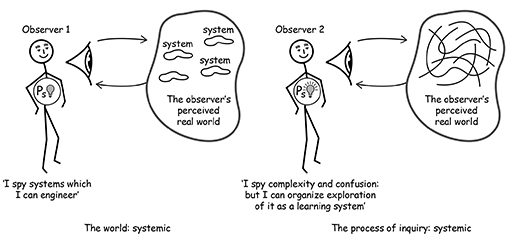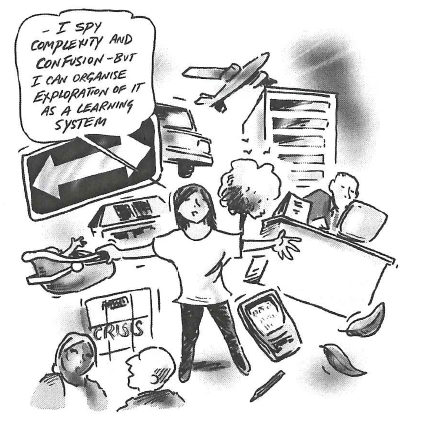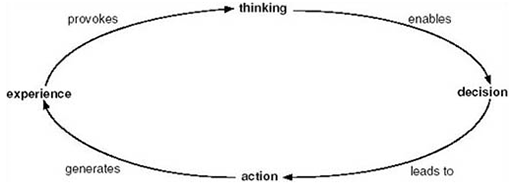1 What does a systems practitioner do?
The frequency with which we perceive mess or complexity is high, so it seems to make sense to envisage a role for the systems practitioner as someone engaged in managing. I do not have a new professional management elite in mind – though this could also exist – but more a citizenry enabled with systems thinking and practice. I am aware, for example, of the millions of people around the world who now engage in local and family history research. It seems many live with a passion for explaining who they are and where they have come from. I would describe all of these people as researchers. So, for me researchers are not just confined to laboratories and universities.
Research in this sense is willed action, done for a purpose, though the purpose may not be clear and involve a mix of emotion and intellect. At this stage of the course, I am going to suggest that taking purposeful action about an issue or situation experienced as complex is at the core of managing complexity.
The enactment of systems thinking in any particular systems approach by a systems practitioner is also an enactment of the experiential learning cycle. Experience, and learning from experience, is a major theme throughout this course. The model of experiential learning developed by David Kolb is increasingly well known and used as a conceptual basis for the design of all sorts of processes from curricula to consultancies (Figure 1). In itself, the model is powerful but it does not address what is meant by experience or learning. The history of Kolb's articulation of this cycle can be traced back to the work of Kurt Lewin shortly after the Second World War. Lewin is generally recognised as the originator of the notion of action research. When we connect with this history, it is possible to recognise the experiential learning model as a model for action research as well.
The idea of the systems practitioner as action researcher is central to the Masters programme in Systems Thinking in Practice [Tip: hold Ctrl and click a link to open it in a new tab. (Hide tip)] at The Open University. These ideas also provide a conceptual framework to imagine what the life-long learner might be, this idealised person that has become so popular in recent discourse.
An aware practitioner-as-manager, having chosen to take a systems approach, will always face choices. One of the main choices is whether to formulate a system of interest as part of a process of understanding a situation experienced as complex, a systemic process of inquiry, or to see systems as operational parts of a taken for granted ‘real world’. This choice is depicted in Figure 2 with respect to the stick person cartoons used in the introductory videos for many of the weeks and also in the two other cartoon images you will have seen earlier in the course.

The systemic approach involves using systems thinking to construct an epistemological device as part of an inquiry process through which we can generate fresh and insightful explanations and which trigger new ways of taking purposeful action in the world.
Based on my experience, the systematic route is inherently conservative and likely to result in first-order change: doing the same thing more effectively or optimally (see Ison and Russell, 2000). This has its place. The systemic route opens up the possibility of second-order change that changes the ‘whole system’. An example here is encompassed by asking the following: what is the system to which the x (x being a particular intervention in a context) is the answer (the how)? The systemic exploration of this question enables new systems of interest to be formulated, which can be used by those in the situation to arrive at new understandings on which to base their actions.



